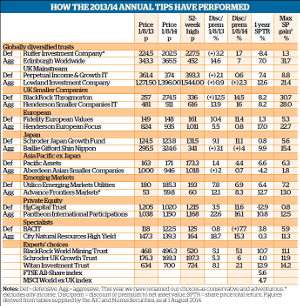Investment trust tips weather stormy six months
20th August 2014 09:56
by Fiona Hamilton from interactive investor
Share on
A number of our annual investment trust tips made a strong start last year, as the column in the table below (click to enlarge) showing maximum share price gains demonstrates. Disappointingly, the majority were well below their peaks by the end of July.
However, at least one of our choices for each regional sector outperformed both the FTSE All-Share index and the MSCI World ex UK index over the full 12 months.
, , , and were all among the more rewarding trusts in their sectors. Two of the three expert selections ended the period with double-digit returns intact.
Disastrous timing
Our biggest disappointment was , managed by Baillie Gifford. It replaced sister trust as our aggressive global selection last year because it had a very similar investment philosophy and portfolio, which was more concentrated than Scottish Mortgage, and the shares traded on a much wider discount to net asset value (NAV).

As a result the shares gained nearly 32% over the six months to the end of January. Unfortunately, the timing of the change in remit proved disastrous, as the realigned portfolio was ravaged by the spring sell-off in high growth shares, coupled with waning investor enthusiasm for smaller companies.
EWI's shares gave up two thirds of their earlier gain over the six months to end July. The change in remit could prove very successful, but it will take time for the new team to show its paces. As a result we have reverted to Scottish Mortgage Trust for this year's aggressive global choice.
Our two smaller company selections also made splendid starts, but gave up a lot of ground later in the period. We had expected to hold up well in a setback, thanks to its substantial portfolio of contracts for difference (CFD). However, the CFD portfolio proved just as vulnerable as the trust's exposure to FTSE 250 companies.
Profit-taking
Mike Prentis, who manages BRT's long-only portfolio, says good-quality companies in the FTSE 250 were hit by sustained profit-taking following the sell off in US technology shares.
In addition, both sections of the trust's portfolio suffered from sharp falls in , an exhibition company heavily exposed to Russia and the former Soviet Union, and .
Prentis has an impressive five- and 10-year record, but we have dropped BlackRock Throgmorton from our roster because Prentis's long-term colleague Richard Plackett, who was responsible for the CFD portfolio, is on a six-month sabbatical. We would like to be sure he's coming back.
Our two UK mainstream selections achieved similar NAV total returns, but Lowland was rewarded with stronger share price returns because it moved to a small premium.
Investors should note that we have retained it as our aggressive choice, and that is likely to prove more resilient in difficult markets, as has been the case over the past six months.
US dollar weakness was a problem for a number of our selections. It considerably reduced the NAV total returns of Pantheon International Participations, which has well over half its assets in the US, and was a headwind for both our Asian trusts and for Utilico Emerging Markets.
It was also a major factor in the 3.6% fall in NAV total returns. Nearly a quarter of Ruffer's portfolio is dollar-denominated, and its managers did not hedge that exposure.
Gains on other fronts did not compensate for the fall in the dollar/sterling exchange rate, and the downturn in Ruffer's NAV led to a worse fall in the share price because the trust lost its premium rating.
This article is for information and discussion purposes only and does not form a recommendation to invest or otherwise. The value of an investment may fall. The investments referred to in this article may not be suitable for all investors, and if in doubt, an investor should seek advice from a qualified investment adviser.